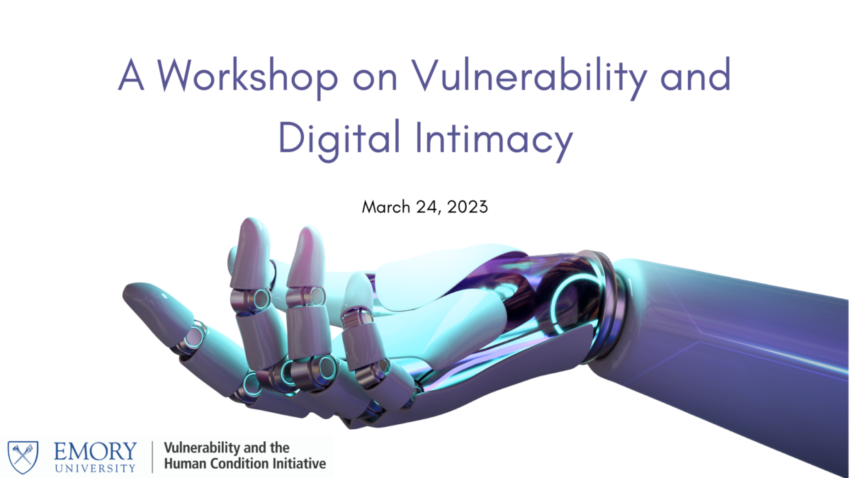March 24, 2023 at Emory University School of Law

Has human interaction with social robots and other forms of artificial intelligence evolved to the point where such interaction could constitute an “intimate relationship?” If so, how should these interactions be regarded and regulated? On the other hand, how might this type of interaction ultimately affect the form, nature, and need for intimacy between humans? This workshop will explore how vulnerability theory can be applied to these and other questions arising from digital intimacy, considering how state and social responsibility for the technological future should be defined and incorporated into an ethical framework for the development and use of AI.
Current scholarship on ethical AI often engages with notions of privacy and trust through a consumer protection framework. Considering users of AI systems as mere “consumers” obscures the many social and environmental constraints on consumer choice, including the deep emotional, and sometimes even romantic, attachments that humans may form with AI. Voice assistants such as Siri and Alexa, chatbots, and therapeutic and home robots have increasingly become our companions, caregivers, and confidants. Instead, centering possible emotional connections allows us to view the sharing of information with AI as a potentially intimate or trusting act, rather than a mere conferral of personal data. Manipulation or coercion on the part of a commercialized AI system could be characterized as a form of “intimate deception” rather than merely consumer fraud. This conceptual shift broadens the traditional consideration of harm in human-AI interaction to include the emotional and psychological harm caused by the betrayal of intimate trust.
Similarly, consumer privacy discourse obscures the role of AI in creating and altering intimate human relationships. AI systems are more than mere consumer “products.” They have become essential for humans to thrive and participate in society, not only as economic actors, but in their intimate lives. Interaction through social media or dating apps is heavily mediated by algorithms that structure the possibilities for connection. Even algorithms traditionally classified as “decision-making,” such as those used to evaluate applications for employment or university admissions or to determine whether to grant bail to criminal detainees, could (in the context of a robust sense of state responsibility) be conceptualized as relational. Such a framing centers the impact these algorithms may have on the formation and purpose of essential collaborative social relationships, such as teacher/student or employer/employee. The successful formation and realization of such relationships is essential for societal, as well as individual, wellbeing.
A vulnerability analysis widens the consideration of injury, as well as what would be an appropriate legal remedy beyond the individual or discrete “vulnerable population.” As embodied beings, humans are inherently and consistently vulnerable to changes in the physical and social conditions that shape our day-to-day lives. Recognizing this universal vulnerability mandates that a “vulnerable subject” be at the heart of any system of governance, including ethical or professional systems.
How should laws or rules developed in response to evolving technology address human vulnerability to change? How should they address our inherent dependency on social relationships to gain the resources needed for resilience to meet that change? AI can be considered to foster resilience by providing (or at least appearing to provide) these intimate social relationships. At the same time, AI has the potential to alter or displace human connection in ways that may ultimately be resilience-draining. Focusing on vulnerability and resilience could allow legal frameworks to proactively consider these social harms and benefits and to address the vulnerabilities of the institutions and individuals involved in the development of AI, rather than reducing human-AI interaction to a series of individual consumer choices implicating individual rights and remedies.
We intend this workshop to cover a broad range of topics centering on legal and ethical responsibility for digital intimacy and the role of vulnerability and humanity in this regulation. We welcome the participation of scholars working in law, technology, and related disciplines, including anthropology, history, political science, sociology, and social psychology.
Issues for discussion may include:
- How should we allocate responsibility for regulating digital intimacy between “public” and “private”?
- If AI changes the nature of human interaction, how should law respond to these changes?
- What types of professional ethical considerations do we need to ensure AI systems are responsive to human vulnerability?
- How could human-machine interaction or purely digital human interaction change our understandings of intimacy?
- How might it affect our understanding of reciprocity and trust? Autonomy and consent?
- Are traditional legal regulation devises, such as torts, contract, criminal, and constitutional law appropriate for human-AI interaction?
- How would a vulnerability approach differ from traditional risk-based or rights-based frameworks for AI management?
- How do we conceptualize “intent” when considering manipulation and deception?
- If AI interaction with humans can be considered “intimate,” should it be commercialized?
- Should the anthropomorphic nature of some AI systems mediate our legal and ethical responses?
- What, if any, legal subjectivity should be granted to AI?
Vulnerability & Resilience Background Reading: http://web.gs.emory.edu/vulnerability/
AI Background Reading available here.
Submissions Procedure:
Email an abstract (of up to 500 words) as a Word or PDF document by
January 20, 2023, to Mangala Kanayson (mkanays [at] emory [dot] edu).
Working paper drafts will be due March 10, 2023, so they can be duplicated and distributed prior to the Workshop. Workshop Details:The Workshop will be held on Friday, March 24 from 9:00 AM to 5:00 PM at Emory University School of Law in Atlanta, GA. Participants may attend in person or via Zoom.
Register for the workshop here.
The workshop is being convened by:
Rachele Carli, AI Robolab, University of Luxembourg (rachele [dot] carli2 [at] unibo [dot] it),